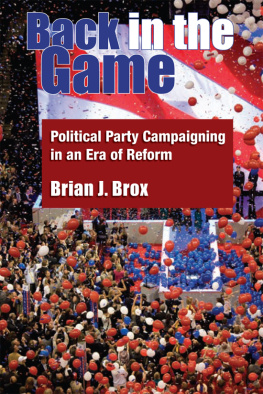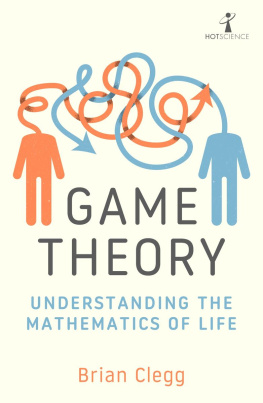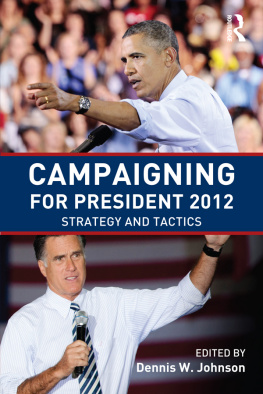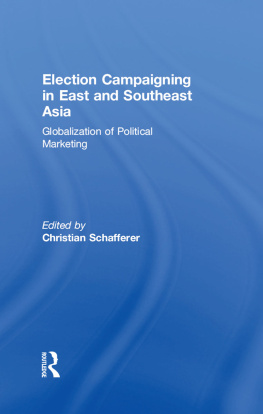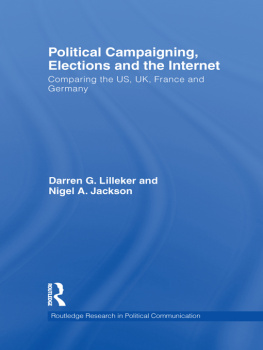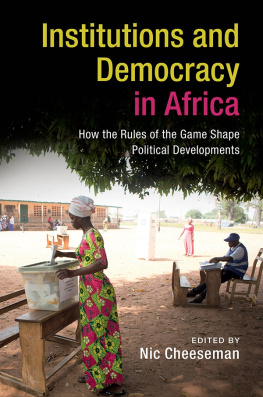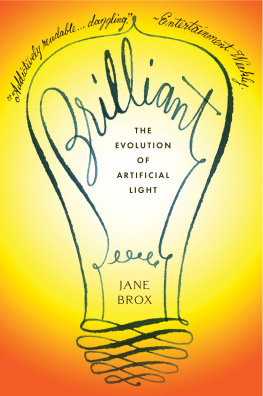BACK IN THE GAME
Political Party Campaigning in an Era of Reform
BRIAN J. BROX
STATE UNIVERSITY OF NEW YORK PRESS
Cover photograph: 2008 Republican political convention, by Carol M. Highsmith.
From the Carol M. Highsmith Library of Congress America Collection.
Used by permission.
Published by
STATE UNIVERSITY OF NEW YORK PRESS, ALBANY
2013 State University of New York
All rights reserved
Printed in the United States of America
No part of this book may be used or reproduced in any manner whatsoever without written permission. No part of this book may be stored in a retrieval system or transmitted in any form or by any means including electronic, electrostatic, magnetic tape, mechanical, photocopying, recording, or otherwise without the prior permission in writing of the publisher.
For information, contact
State University of New York Press, Albany, NY
www.sunypress.edu
Production, Laurie Searl
Marketing, Anne M. Valentine
Library of Congress Cataloging-in-Publication Data
Brox, Brian J., 1975
Back in the game : political party campaigning in an era of reform / Brian J. Brox.
p. cm.
Includes bibliographical references and index.
ISBN 978-1-4384-4607-3 (hardcover : alk. paper)
1. Political campaignsUnited StatesHistory21st century. 2. Political partiesUnited StatesHistory21st century. I. Title.
JK2281.B78 2013
321.70973dc23
2012017400
10 9 8 7 6 5 4 3 2 1
For Christy
LIST OF ILLUSTRATIONS
FIGURES
TABLES
ACKNOWLEDGMENTS
This book would not have been possible without the cooperation, assistance, and support of a number of individuals to whom I am profoundly grateful. First, I wish to thank several current and former political party staffers who provided keen insights into the working of their respective organizations: Jeff Berkowitz, Jeff Burton, Mike DuHaime, Rob Jesmer, John Lapp, Tom McMahon, Brian Noyes, James Quinn, and Keelan Sanders.
Second, I wish to thank numerous academic colleagues whose advice helped improve this book. At the University of Texas at Austin, I wish to thank several faculty members and former graduate students, including Neal Allen, Brian Arbour, Joe Giammo, Danny Hayes, Tse-min Lin, Robert Luskin, Seth McKee, Mark McKenzie, Phil Paolino, Brian Roberts, Jeremy Teigen, Mike Unger, Don Zinman and especially Daron Shaw, who provided helpful criticism and numerous suggestions that greatly strengthened this book. At Tulane University, I wish to thank current and former colleagues Mary Clark, Patrick Egan, Chris Fettweis, Tom Langston, Celeste Lay, Casey Love, Martn Mendoza-Botelho, Nancy Maveety, Tony Pereira, Raul Sanchez Urribarri, Aaron Schneider, Martyn Thompson, Mark Vail, and Dana Zartner. Tulane also made significant resources available to make this research possible, and I appreciate the support provided by the Charles E. Dunbar Jr. Lecture and Research Fund in Political Science, the Research Enhancement Fund, the Committee on Research Summer Fellowship, the School of Liberal Arts Book Subvention Grant, and the Provost's Fund for Faculty/Student Scholarly Engagement. I also thank Michael Franz, who as a discussant at the Midwest Political Science Association annual meeting provided useful comments on an early draft of the third chapter of this book.
Third, I wish to acknowledge the assistance of a number of people at Tulane University and at State University of New York Press. At Tulane, Caroline Allen, Rachel Applestein, Megan Boudreaux, Saisha Chandrasekaran, M. Page Clayton, Patrick Dick, Jennie Kamin, Laura Lightbody, Austin Parker, Ben Probber, and Jennifer Sheppard provided valuable research assistance. At State University of New York Press, I thank Michael Rinella and two anonymous reviewers for helping me transform a rough manuscript into a finished book.
Last, but certainly not least, I wish to thank my family. I owe a tremendous debt to my parents, Al and Marcia, and to my sister, Ali, for their love and support through the years. I also appreciate the support of the extended Brox, Buchanan, Cyphers, and Kirk families, especially that of Rick Hoppe, who is not only a great cousin but also a keen political operative whose assistance greatly improved this book. Of course, my wife, Christy, has been my greatest source of love, support, and encouragement. I am forever grateful for her assistance and patience as I faced the arduous task of completing this manuscript.
ONE
THE PARTIES STRIKE BACK
In the aftermath of his party's defeat in the 2004 presidential election, Howard Dean launched his candidacy for the chairmanship of the Democratic National Committee with a bold suggestion. At a forum for eight potential successors to previous DNC chairman Terry McAuliffe, Dean suggested that the Democrats adopt .a 50-state strategy in this country, not an 18-state strategy. If you don't run, you can't win, ().
With the Fifty-State Strategy, Dean was advocating a shift in focus away from a single-minded pursuit of short-term electoral success. Instead, Dean was arguing that Democrats should campaign in areas that were not immediately competitive in hopes of making them competitive in the future. To that end, the Democratic National Committee would place renewed emphasis on building grassroots organizations). But the true test of the Democrats' strategy shift would be seen beyond 2008.
Around the same time, the Republican National Committee was in the midst of a project that would radically alter the way it would persuade and mobilize voters. Following the 2000 election,
Republican technicians began to upgrade their Voter Vault database. Essentially an electronic card catalog of the nation's potential voters, Voter Vault, according to the instruction and training manual the R.N.C. distributes, allows Republican workers to log on over the Internet, pull up a voter profile and thenafter calling that particular voter or making a home visit with a hand-held computeradd vital personal information to the record This under-the-radar data-mining campaign has been joined more visibly by Republican figures [who] asked supporters to supply the party with their church membership rolls, hunting-club registries, college-fraternity directories and P.T.A. membership rosters. The hope is not only to target individuals and specific segments of society, but also to get those quarries into the voting booths. We can tailor our message to people who care about taxes, who care about health care, who care about jobs, who care about regulationwe can target that way, [said] Ed Gillespie, the Republican National Committee chairman. ()
Voter Vault would make use of advanced (and cheap) computer technology as well as developments in market research to compile a national voter file with extensive political, cultural, and consumer data on each voter. With these data, Republican candidates and party organizations could microtarget votersdeliver narrowly tailored messages directly to votersrather than rely on television advertisements and hope that targeted groups would be watching the right channel at the right time.




